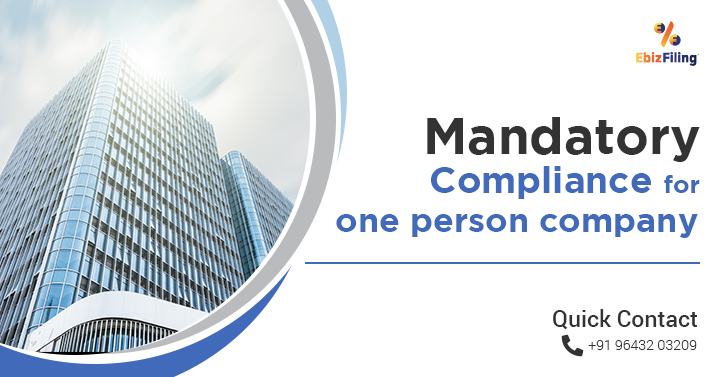Other Necessary Compliances
1. PAN, TAN & GST Compliance
If your OPC is engaged in taxable goods/services or exceeds the turnover threshold, it must comply with GST registration and return filing. The company also needs to obtain PAN for tax purposes and TAN for TDS (Tax Deducted at Source) if applicable. These registrations ensure proper tax deductions, returns, and compliance with GST laws.
2. TDS Deduction & Filing (if applicable)
If your OPC has transactions that require TDS deduction (e.g., salary, contract payments), it must comply with TDS provisions. This includes timely deduction of TDS, its deposit with the government, and the quarterly filing of TDS returns (Form 24Q, 26Q). Failure to comply can lead to penalties and interest.
3. Professional Tax Registration (if applicable by State)
Certain states in India, such as Maharashtra or Karnataka, require OPCs to register and pay Professional Tax. Depending on the state, this tax is paid annually or monthly, and timely filing of returns is essential to avoid penalties. Ensure your OPC meets the professional tax compliance requirements in the state of operation.
4. Annual General Meeting (AGM) – Exemption for OPCs
One of the key advantages of a One Person Company is the exemption from holding an Annual General Meeting (AGM), unlike other corporate structures. As per the Companies Act, 2013, OPCs are not required to conduct an AGM. Instead, any resolutions that would normally be passed at an AGM can simply be entered in the minutes book and signed by the sole member.
This compliance relaxation simplifies operations for OPC owners and eliminates the need for formal AGM-related procedures. However, despite this exemption, all filing obligations related to financial statements and annual returns must still be fulfilled as per the prescribed due dates.
5. Upgradation of MCA Master Data
It is crucial for OPCs to keep their MCA Master Data updated on the Ministry of Corporate Affairs (MCA) portal. This includes the accurate listing of details such as registered office address, share capital, and directors. Regular updates ensure the company’s legal standing and compliance with government regulations.
Understanding Form MGT-7 vs. MGT-7A for OPC
Earlier, companies; including OPCs were required to file their annual return using Form MGT-7. However, the Ministry of Corporate Affairs has introduced Form MGT-7A specifically for One Person Companies and small companies. This is a simplified version of the original form and is tailored to suit the reduced compliance burden on smaller entities.
It’s important to note:
- Form MGT-7A is now the standard for OPCs.
- It must be filed within 60 days from the end of the financial year, not from the AGM date, since OPCs are exempt from holding an AGM.
Failing to understand this distinction could lead to delays and penalties, so business owners must ensure they are filing the correct form within the correct timeframe.
What are the Penalties for Non-Compliance?
Failing to comply with mandatory requirements can lead to monetary penalties and legal consequences for both the OPC and its director. Here are some common penalties:
| Non-Compliance | Penalty |
| Non-filing of AOC-4 (Financial Statements) | ₹100 per day of default (no upper limit), until the form is filed. |
| Non-filing of MGT-7A (Annual Return) | ₹100 per day of default, till the date of filing (no upper limit). |
| Failure to Appoint Auditor | Company and every officer in default: Penalty up to ₹1,00,000 and ₹5,000 per day for delay. |
| Non-filing of Income Tax Return | ₹1,000 to ₹10,000 under Section 234F, depending on income slab and delay. |
| Failure to maintain statutory records | Penalty may extend up to ₹25,000. |
| Director KYC not filed (DIR-3 KYC) | DIN gets deactivated + ₹5,000 penalty for reactivation. |
Note: The Ministry of Corporate Affairs (MCA) and Income Tax Department are strict with deadlines, and repeated defaults may lead to disqualification of directors, strike-off of the company, or legal proceedings.
Conclusion
Staying compliant is crucial for the smooth functioning and credibility of a One Person Company in India. From filing annual returns to maintaining statutory records, every compliance step ensures your OPC remains legally sound and penalty free. Timely adherence to these requirements not only avoids legal consequences but also builds a strong foundation for business growth.
Suggested Read :
Benefits of One Person Company
Legal Consequences of Strike Off OPC











Reviews
Amruta Thalange
15 Oct 2020Jitendra Nawrange
09 Aug 2019I am very happy that I am connected to your company. I have liked the service of your company, which provides me the right time for every information. Thank you very much to all your employees. I will always be connected to your company and will tell everyone about your company. thank you ebiz team.
December 17, 2025 By Dhruvi D
OPC Compliance: Annual Filing Notes and Document Checklist with Ebizfiling At Ebizfiling, we help One Person Companies (OPCs) in India meet all MCA annual compliance requirements like AOC-4, MGT-7A, DIR-3 KYC, and DPT-3. Our team tracks deadlines, files forms accurately, […]
November 22, 2025 By Dhruvi D
Why OPC Filing Deadlines Catch Founders Off Guard in India? Introduction OPC filing deadlines in India often catch founders off guard. Strict annual compliance requirements ensure an OPC’s legal status, and missing these deadlines can lead to heavy penalties or […]
September 20, 2025 By Dhruvi D
OPC vs Pvt Ltd Compliance: Who Files Less and Pays Fewer Penalties? Introduction For any entrepreneur, knowing about OPC vs Pvt Ltd Compliance is essential. A Pvt Ltd firm is best for teams looking for growth and finance, whereas OPC […]